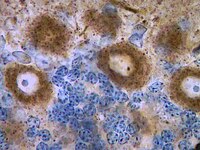MABN24 Sigma-AldrichAnti-pan-Shank Antibody, clone N23B/49
Detect pan-Shank using this Anti-pan-Shank Antibody, clone N23B/49 validated for use in WB, IH(P).
More>> Detect pan-Shank using this Anti-pan-Shank Antibody, clone N23B/49 validated for use in WB, IH(P). Less<<Produits recommandés
Aperçu
| Replacement Information |
|---|
Tableau de caractéristiques principal
| Species Reactivity | Key Applications | Host | Format | Antibody Type |
|---|---|---|---|---|
| R, M, H | WB, IH(P) | M | Purified | Monoclonal Antibody |
| References |
|---|
| Product Information | |
|---|---|
| Format | Purified |
| Control |
|
| Presentation | Purified mouse monoclonal IgG1κ in buffer containing 0.1 M Tris-Glycine (pH 7.4), 150 mM NaCl with 0.05% sodium azide. |
| Quality Level | MQ100 |
| Physicochemical Information |
|---|
| Dimensions |
|---|
| Materials Information |
|---|
| Toxicological Information |
|---|
| Safety Information according to GHS |
|---|
| Safety Information |
|---|
| Storage and Shipping Information | |
|---|---|
| Storage Conditions | Stable for 1 year at 2-8°C from date of receipt. |
| Packaging Information | |
|---|---|
| Material Size | 100 µg |
| Transport Information |
|---|
| Supplemental Information |
|---|
| Specifications |
|---|
| Global Trade Item Number | |
|---|---|
| Référence | GTIN |
| MABN24 | 04053252523830 |
Documentation
Anti-pan-Shank Antibody, clone N23B/49 FDS
| Titre |
|---|
Anti-pan-Shank Antibody, clone N23B/49 Certificats d'analyse
| Titre | Numéro de lot |
|---|---|
| Anti-pan-Shank, clone N23B/49 - 2445048 | 2445048 |
| Anti-pan-Shank, clone N23B/49 - 2043216 | 2043216 |
| Anti-pan-Shank, clone N23B/49 - 2192072 | 2192072 |
| Anti-pan-Shank, clone N23B/49 - 2283569 | 2283569 |
| Anti-pan-Shank, clone N23B/49 - 3328966 | 3328966 |
| Anti-pan-Shank, clone N23B/49 - 3468322 | 3468322 |
| Anti-pan-Shank, clone N23B/49 - 3574547 | 3574547 |
| Anti-pan-Shank, clone N23B/49 - 3886038 | 3886038 |
| Anti-pan-Shank, clone N23B/49 - 4132012 | 4132012 |
| Anti-pan-Shank, clone N23B/49 - 4231222 | 4231222 |









